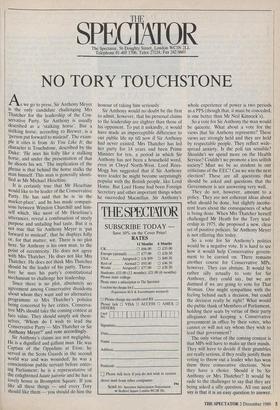The Spectator, 56 Doughty Street, London WC1N 2LL Telephone 01-405
1706; Telex 27124; Fax 242 0603
NO TORY TOUCHSTONE
It is certainly true that Mr Heseltine would like to be leader of the Conservative Party. He has said that he is 'in the market-place', and he has made compari- sons between Winston Churchill and him- self which, like most of Mr Heseltine's utterances, reveal a combination of steely purpose and unfailing bad taste. But it is not true that Sir Anthony Meyer is 'put forward to mislead', that he displays folly or, for that matter, wit. There is no plot here. Sir Anthony is his own man, to the point of eccentricity. He does not agree with Mrs Thatcher. He does not like Mrs Thatcher. He does not think Mrs Thatcher should be the leader of his party. There- fore he uses his party's constitutional mechanism to challenge her leadership.
Since there is no plot, absolutely no agreement among Conservative dissidents about whom they want and no alternative programme to Mrs Thatcher's policies being concerted by her critics, Conserva- tive MPs should take the coming contest at face value. They should simply ask them- selves, 'Whom do I wish to lead the Conservative Party — Mrs Thatcher or Sir Anthony Meyer?' and vote accordingly.
Sir Anthony's claims are not negligible. He is a dignified and gallant man. He was Captain of the Oppidans at Eton; he served in the Scots Guards in the second world war and was wounded; he was a conscientious public servant before enter- ing Parliament; he is a representative of the enlightened haute juiverie and he has a lovely house in Brompton Square. If you like all these things — and every Tory should like them — you should do him the honour of taking him seriously.
Sir Anthony would no doubt be the first to admit, however, that his personal claims to the leadership are slighter than those of his opponent. To put it unkindly, it would have made an imperceptible difference to our public life up till now if Sir Anthony had never existed. Mrs Thatcher has led her party for 14 years and been Prime Minister for ten, a period in which Sir Anthony has not been a household word, even in Clwyd North-West. Lord Rees- Mogg has suggested that if Sir Anthony were leader he might become surprisingly popular with the British people, like Lord Home. But Lord Home had been Foreign Secretary and other important things when he succeeded Macmillan. Sir Anthony's
whole experience of power is two periods as a PPS (though that, it must be conceded, is one better than Mr Neil Kinnock's).
So a vote for Sir Anthony the man would be quixotic. What about a vote for the views that Sir Anthony represents? These views are strongly held and they are held by respectable people. They reflect wide- spread anxiety. Is the poll tax sensible? Shouldn't we spend more on the Health Service? Couldn't we promote a less selfish society? Must we be so strident in our criticisms of the EEC? Can we win the next election? These are all questions that should be asked and questions that the Government is not answering very well.
They do not, however, amount to a policy. They are not coherent ideas about what should be done, but slightly incohe- rent fears about the consequences of what is being done. When Mrs Thatcher herself challenged Mr Heath for the Tory lead- ership in 1975, she proposed a new, clear set of positive policies. Sir Anthony Meyer is not offering this today.
So a vote for Sir Anthony's politics would be a negative vote. It is hard to see how it would help Conservative govern- ment to be carried on. There remains another course for Conservative MPs, however. They can abstain. It would be rather silly actually to vote for Sir Anthony, they could say, but we are daMned if we are going to vote for That Woman. One might sympathise with the feeling behind such a decision, but could the decision really be right? What would the public think of Members of Parliament, holding their seats by virtue of their party allegiance and keeping a Conservative government in office by their votes, who cannot or will not say whom they wish to lead that government?
The only virtue of the coming contest is that MPs will have to make up their minds. They will have to decide if their grumbles are really serious, if they really justify them voting to throw out a leader who has won them three consecutive elections. Now they have a choice. Should it be Sir Anthony or Mrs Thatcher? It would be rude to the challenger to say that they are being asked a silly question. All one need say is that it is an easy question to answer.










































































 Previous page
Previous page